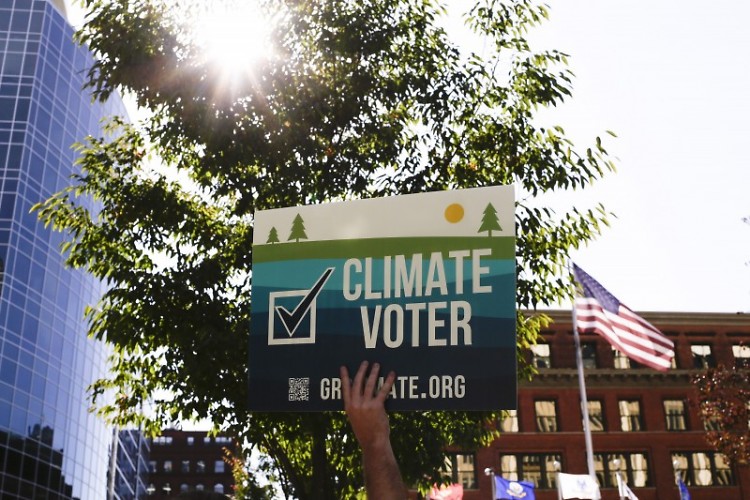Make sure you are voting for candidates that share your sustainability goals by checking out the Grand Rapids Climate Coalition’s 2024 Climate Voter Resources. The Coalition has created a survey for local candidates—for the Grand Rapids Mayor and City Commission, and the Kent County Commission—to share their views on climate and environmental justice and their plans to address them if elected. See the 2024 candidate responses at grclimate.org or espanol.grclimate.org.
By Cristina Stob
With federal, state, and local elections happening now, it is of utmost importance to keep a clear eye on the future when voting. National voting polls consistently find that the economy is ranked as a very important issue to 81% of voters across the political spectrum. It is concerning then that only 37% of voters listed climate change as a top priority when considering candidates.
The effects of climate change are so entwined with the overall economy of the United States that it is difficult to find an area of life that the climate doesn’t reach. Consider the following examples. Extreme weather events and violent conflict are the two biggest drivers of forced migration globally, displacing 30 million people annually. The increasing cost of housing is exacerbated by climate change by driving up the cost of home insurance by 21% just from 2022-2023. Car insurance costs increased 26% in 2024, with the highest costs occurring in Louisiana and Florida, the states most frequently hit by hurricanes and tornadoes. Access to healthy food and farmer livelhood is greatly affected by the multiple effects of climate change on growing seasons, frost cycles, droughts, wildfires, floods, decreasing populations of insect pollinators, toxic waste in air and water systems, and the list goes on in this report by the EPA (this year’s disastrous cherry season in northern Michigan comes to mind). Aging infrastructure can’t accommodate flash flooding in the sewer systems, road washouts, dam failures, and urban heat islands. In the past four decades, the United States has spent over $2.6 trillion on weather and climate-related disasters.
The Inflation Reduction Act (IRA), passed in August of 2022, is the largest investment in climate harm reduction in United States history. Yet despite this big step by the federal government to address climate change, in 2024 still 23% of the United States Congress denies the human contribution to climate change. Not coincidentally, this same cohort of representatives has received a combined lifetime total of $52 million dollars from fossil fuel companies. The rhetoric and lack of action from these elected members contributes to climate denial, shifting of blame, and outright nihilism.
But even with misinformation campaigns, most of the world agrees that climate change is being exacerbated by human interference and poses a serious threat to humanity. In a survey polling people from 63 different countries, 86% believe humans are causing climate change, and 73% believe it is a serious threat.
Being the largest producer of fossil fuels and the historically largest emitter of carbon emissions, the United States government and its citizens have more to answer to in regards to climate devastation than most. Though economically rich, United States citizens feel pinched by ever increasing prices in food, rent, housing, mortgage rates, student loans, and healthcare costs; however, none of these very real concerns excuse us of our debt to the planet, future generations, and ourselves. Yes, we need a better social safety net; yes, we need investment in higher education and senior care, and all of these concerns require a planet that sustains life.
How can voters make a difference? Make sure you are voting for candidates that share your same goals by checking out the Grand Rapids Climate Coalition’s 2024 Climate Voter Resources. The Coalition has created a survey for local candidates—for the Grand Rapids Mayor and City Commission, and the Kent County Commission—to share their views on climate and environmental justice and their plans to address them if elected. See the 2024 candidate responses here. The survey is also available in Spanish.
Local representatives are an important resource for creating actionable changes in our direct environment, and the Grand Rapids Climate Coalition wants to ensure that citizens can make informed choices about their future (the Coalition does not endorse candidates). You may have seen their colorful ‘Climate Voter’ signs around town (you can pick up your own at WMEAC, Garfield Park Neighborhood Association, the Creston Neighborhood Association, or by contacting [email protected]).
Climate change is a complex issue, touching all of our lives in more ways than are readily apparent. Intersecting with concerns of immigration, inflation, health care, and economic equality, climate change affects not only human beings, but every living and non-living thing on the planet. On November 5th, think of the bigger picture and vote like your life, and the life of everything around you, depends on it.
The Rapidian, a program of the 501(c)3 nonprofit Community Media Center, relies on the community’s support to help cover the cost of training reporters and publishing content.
We need your help.
If each of our readers and content creators who values this community platform help support its creation and maintenance, The Rapidian can continue to educate and facilitate a conversation around issues for years to come.
Please support The Rapidian and make a contribution today.
